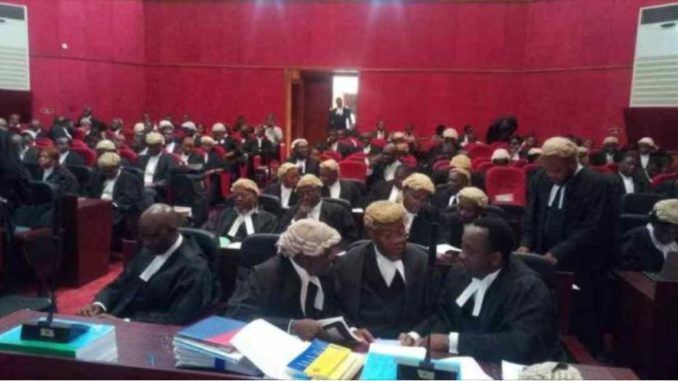
Nearly 180 days after the presidential elections, which took place in February 2019 the Presidential Election Tribunal finally gave its verdict on the contested polls between the ruling party, the All Progressives Congress (APC) and the Peoples Democratic Party (PDP). In a judgment that lasted nearly ten hours, the tribunal affirmed the victory of President Muhammadu Buhari and dismissed all grounds on which Alhaji Atiku Abubakar challenged the former’s victory.
The PDP and its candidate challenged the ruling of the tribunal at the Supreme Court yesterday. This is as it should be. Political gladiators in a democracy must always respect the institutions, which provide stability for the country. If they inadvertently destroy the country with self-help, there would be no nation to govern.
We commend all parties in the dispute for playing by the rules of the game. One of the pillars of democracy is the rule of law by which the judiciary is allowed to interpret laws and make pronouncements where necessary. The courts ought to be impartial arbiters on all matters that are brought before justices of the law. Also, where individuals feel aggrieved by a process, or as in this case, an election result, there are channels open to them to seek redress. It was in consonance with this abiding principle that Atiku headed for the courts when he lost the February elections. He did not resort to violence nor did he make incendiary pronouncements, which could set the nation ablaze and make it ungovernable. He did not urge supporters to take the laws into their hands even though he had reservations about the independence or impartiality of INEC. Rather he put his faith in the judiciary, the bastion of justice and the hope of the common man.
On its part the judiciary went into the arduous task of hearing the matter, dismissing motions and countermotions, until it finally reached a verdict. There were technicalities along the way. Lawyers on both sides tried to get the better of one another. But the panel of justices was up to the task and soon waded through tonnes of material to give a convincing verdict. For while the trial lasted, the judiciary itself was on trial, both in the eyes of the citizenry and international community. Partisans on the case have expressed their views either in support or against, primarily along the lines of self-interest. Lawyers have also argued on the subject. Social media has also been inundated with all kinds of theories. Yet, the judiciary has discharged itself and until the Supreme Court rules otherwise, the extant law is that of the tribunal.
The apparent equanimity of the court cannot be said of the ruling party however. Whether by design or default, the impression had been created that the government and its agencies had orchestrated a grand plan within the judiciary to work to an answer. These are mere speculations and conspiracy theories. The fact on the ground is that a competent court has declared Buhari winner of the presidential elections. Whatever the situation, it is axiomatic to state that justice must not only be done; it must be seen to be done.
We are not to interrogate the details of the judgment. However, it is important to state that two major principles were in contention in law. One was the originalist principle by which we mean the intendment of the law. The second had to be with the environmentalist viewpoint, which compels us to examine laws with regard to how the founding fathers would have handled issues if they were confronted with them. To be sure, judges would disagree. For example, the Scottish and English courts have reached different conclusions on proroguing parliament. The Supreme Court of United Kingdom yesterday gave its verdict when it ruled that the suspension of parliament by the British Prime Minister, Boris Johnson was unlawful. In all, it is the principles upon which a verdict is given, that are significant.
By the rules of engagement in the rule of law, we are bound to respect the verdict of courts even if we do not agree with the judgments. Anything to the contrary would amount to jungle justice or anarchy. Where we disagree or are dissatisfied, we are allowed to go on appeal until all channels for redress are exhausted. And this principled approach to law must be respected at all times. The incumbent government should see the wisdom behind respecting courts’ decisions in all matters. No one is above or should be above the law. What is sauce for the goose is sauce for the gander. Indeed, it is imperative on the government and its agencies to set the standard by respecting the independence of the different arms of government. That way, we would build a stable polity that would engender growth and development.
Finally, we urge stakeholders in Project Nigeria to respect the rule of law at all times. The future and stability of the country is more important than any individual or sectional interest. The judiciary must continue to be impartial and stand in absolute neutrality on all matters that are brought for adjudication. Let democracy be the winner; not individual ego or any narrow selfish interests.
END

Be the first to comment